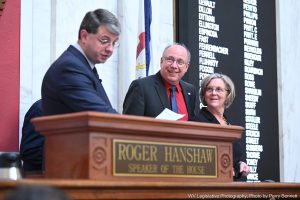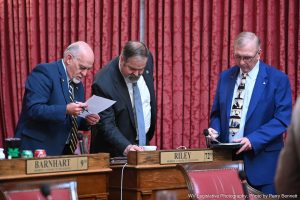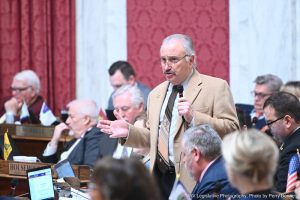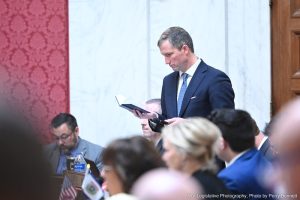During the first session of the 86th Legislature, 333 bills completed the legislative process. Of the 333 bills, 203 were House Bills and 130 were Senate Bills. Thus far, the Governor has signed 109 bills and 2 became law without signature. For a PDF list of completed legislation, please see Completed Legislation of the 2023 Regular Session.
Here are 86 House Bills, which completed the legislative process:
House Bill 2002 increases the nonfamily adoption tax credit from $4,000 to $5,000. The bill also provides for early intervention services for adopted children; including, Right From the Start, Drug-Free Moms and Babies, and Birth to Three.” The bill also establishes the WV Mothers and Babies Pregnancy Support Program under the Bureau for Public Health.
House Bill 2004 creates the Second Amendment Financial Privacy Act, which prohibits the disclosure of customers’ protected financial information relating to firearm purchases to a government entity.
House Bill 2005 establishes a dual enrollment pilot program to be administered by the HEPC and the CCTCE with the State Board of Education. The four-year program shall offer dual enrollment courses for individual career pathways in direct care health professions, IT, STEM, education, advanced manufacturing, welding and fabrication, construction, and agriculture.
House Bill 2006 reorganizes the Department of Health and Human Resources into three departments: the Department of Health, the Department of Human Services, and the Department of Health Facilities. The three departments will be served by one Office of Share Administration for administrative services, human resources, finances, and information technology.
reorganizes the Department of Health and Human Resources into three departments: the Department of Health, the Department of Human Services, and the Department of Health Facilities. The three departments will be served by one Office of Share Administration for administrative services, human resources, finances, and information technology.
The Department of Health will oversee the Bureau for Public Health, Office of Emergency Medical Services, Office of the Chief Medical Examiner, Center for Threat Preparedness, Health Care Authority, and Office of the Inspector General -which oversees OHFLC, the Board of Review, the Foster Care Ombudsman, the Olmstead Office, Investigations and Fraud Management, Quality Control, the Mental Health Ombudsman, WV Clearance for Access: Registry and Employment Screening and Human Rights Commission. The bill also gives the Inspector General more autonomy.
The Department of Human Services will oversee the Bureau for Social Services, Bureau for Medical Services, Bureau for Child Support Enforcement, Bureau for Family Assistance, and Bureau for Behavioral Health.
The Department of Health Facilities will oversee all DHHR-owned hospitals, including Hopemont Hospital, Jackie Withrow Hospital, John Manchin Sr. Health Care Center, Lakin Hospital, Mildred Mitchell-Bateman Hospital, Welch Community Hospital, and William R. Sharpe Jr. Hospital.
House Bill 2007 prohibits irreversible gender reassignment surgery and gender-altering medication for minors. The bill provides an exemption for very limited use of gender-altering medication for adolescence diagnosed with severe gender dysphoria.
House Bill 2008 requires local entities to enforce immigration laws. The bill prohibits state and local entities from adopting laws, rules, or ordinances that would restrict compliance with federal immigration laws or immigration officials. The bill states that a non-compliant elected official may be removed from office for neglect of duty and malfeasance in office.
House Bill 2016 requires electronic access to information needed to perform an adoption for child-placing agencies. The bill allows for child placing agencies to disclose confidential information to other child placing agencies or residential childcare and treatment facilities when making referrals or providing services on behave of the child.
House Bill 2018 permits the managed care case coordinator to participate in the multidisciplinary treatment planning process.
House Bill 2024 is the Budget bill for the 2024 fiscal year. The General Revenue Fund total is $4,874,575,878. The State Road Fund total is $1,697,782,874. The Special Revenue is $2,071,416,872. The Lottery (Revenue) Net Profits are $144,077,498. The State Excess Lottery Revenue Fund total is $334,670,790. The Federal Funds total is $9,443,163,508. The Block Grants total is $831,899,732. The General Revenue Surplus is $1,165,478,000. For more on the budget, click here.
House Bill 2026 allows additional opportunities for municipal police officers or firefighters to transfer into the Municipal Police Officers and Firefighters Retirement System.
House Bill 2029 repeals the all-payer claims database.
House Bill 2062 modifies e-bike regulations to be in line with federal law. The bill defines three classes of e-bikes. The bill permits Class 2 to use throttles. It allows all three classes to be operated where traditional non-electric bicycles are allowed.
House Bill 2218 creates the Electronically Distracted Driving Act. The bill states that no person may hold or support a wireless communication device; send or read text or other typed communications; make phone calls; watch videos; record videos; play games; or search websites while operating a vehicle. The bill does provide exceptions for wearing smartwatches and hands-free communications. The bill sets penalties for violating the law: a first offense is a fine of up to $100; a second offense in 24 months is a fine of up to $200; and a third or subsequent offense within 24 months is a fine of up to $350, 3 points on the driver’s record and possible 90-day driver’s license suspension. Any driver who violates this section and causes serious injury to another person is guilty of a misdemeanor and may be penalized with a fine of $500 to $1,000 and/or 120 days in jail. The driver shall have his or her license revoked for one year. Any driver who violates this section and causes death to another person is guilty of negligent homicide and shall be punished accordingly.
creates the Electronically Distracted Driving Act. The bill states that no person may hold or support a wireless communication device; send or read text or other typed communications; make phone calls; watch videos; record videos; play games; or search websites while operating a vehicle. The bill does provide exceptions for wearing smartwatches and hands-free communications. The bill sets penalties for violating the law: a first offense is a fine of up to $100; a second offense in 24 months is a fine of up to $200; and a third or subsequent offense within 24 months is a fine of up to $350, 3 points on the driver’s record and possible 90-day driver’s license suspension. Any driver who violates this section and causes serious injury to another person is guilty of a misdemeanor and may be penalized with a fine of $500 to $1,000 and/or 120 days in jail. The driver shall have his or her license revoked for one year. Any driver who violates this section and causes death to another person is guilty of negligent homicide and shall be punished accordingly.
House Bill 2221 expands the exemption of life insurance proceeds paid out to a bankruptcy debtor. The bill also updates the monetary amounts of several exemptions which have not been adjusted to account for inflation since 1996.
House Bill 2283 clarifies the allowable expenditures for fire departments receiving distributions from the Municipal Pensions and Fire Protection Fund or the Fire Protection Fund. The bill authorizes the use of funding for accident and sickness insurance premiums to cover individual members of a volunteer or part-volunteer fire company; umbrella insurance premiums so long as life insurance and property/casualty insurance are part of any umbrella policy; food, bottled water, and food-related items, such as disposable plates and utensils, to provide necessary meals and water to a fire company when responding to an emergency; and the purchase of land when such purchase increases effectiveness and efficiency. The bill restricts the use of funds for filing fees. The bill also requires all fire companies to have a dedicated bank account for all state funds received.
House Bill 2309 requires the Division of Forestry to create and maintain an online renewal application form for the Managed Timberland Program.
House Bill 2310 authorizes the DMV to develop an antique fleet plate program that allows owners of five or more antique vehicles to use a single registration plate on multiple antique vehicles. The annual registration fee for an antique fleet plate is $2 a year per registered antique vehicle. It is valid for one year and must be renewed annually. The bill also changes the vehicle inspection requirements to once every two years beginning January 1, 2024. The bill increases the sticker fee from $3 to $6 and the inspection fee for not more than $19.
House Bill 2346 declares a shortage of substitute bus operators. The bill authorizes retired bus operators to serve as substitute bus operators in areas of critical shortage without affecting the monthly retirement benefit.
House Bill 2380 closes the School Building Capital Improvements Fund and transfers that money, if any, to the School Construction Fund. The bill requires the School Building Authority to request the Governor to include an amount equal to $24,000,000 in each budget bill as an appropriation to the agency’s General Revenue Fund which is to be transferred to the School Construction Fund. The bill also strikes obsolete language throughout this section of code.
House Bill 2412 declares November 14 every year a special memorial day in remembrance of the Marshall University airplane crash and the 75 persons lost in the crash. The day is to be known as “Marshall University 75 Memorial Day.”
House Bill 2436 requires each healthcare facility to develop an acuity-based patient classification system by July 2, 2024, to be used to establish a staffing plan for each unit. The bill also prohibits an insurer from imposing a copayment, for services rendered by a licensed occupational therapist, licensed occupational therapist assistant, licensed speech-language pathologist, licensed speech-language pathologist assistant, licensed physical therapist, or a licensed physical therapist assistant, that is more than a copayment imposed for the services of a primary care physician or an osteopathic physician.
House Bill 2506 authorizes the DMV to create and regulate a title clearinghouse for nonresident businesses.
House Bill 2509 creates the Uniform Premarital Agreement Act, which provides that a premarital agreement (1) must be in writing, (2) signed by both parties and (3) contain an acknowledgment that both parties have had an opportunity to consult with separate legal counsel. Parties are permitted to contract regarding (1) property rights including the disposition of property upon the dissolution of marriage or death; (2) the modification/elimination of spousal support; (3) the making of a will/trust to carry out the terms of the premarital agreement; (4) ownership rights and disposition of death benefits from life insurance proceeds; (5) choice of law governing construction; and (6) any other matter not in violation of public policy or statute.
The Act further prohibits any agreement whereby the right of a child to support is adversely affected.
After marriage, the agreement can be amended or revoked only if it is in writing and signed by both parties. A premarital agreement may not be enforced against a party if the party contending the agreement is unenforceable proves that: (1) he or she did not execute the agreement voluntarily; (2) either party was under the age of 18; and (3) the agreement was unconscionable when executed and before the execution of the agreement if: the party did not receive adequate financial disclosures, did not voluntary and expressly waive, in writing, any right to disclosure of the property or financial obligation beyond what was provided, or did not know and could not have known of the property or obligations.
The court may refuse to enforce a term of the premarital agreement that (1) is unconscionable at the time of signing or (2) would result in substantial hardship for a party because of a material change in circumstances arising after the agreement was signed (3) adversely affects a child’s right to support or (4) limits or restricts a remedy available to a victor of domestic violence.
House Bill 2515 requires the Bureau for Family Assistance, the HEPC, and Workforce WV to develop and maintain an inventory of available services and supports for individuals qualified to receive federal, federal-state, and state assistance and wish to obtain a degree, secure workforce training, or reenter the workforce. The bill requires the agencies to maintain a document of the services on their websites and distribute the document as needed. The bill also eliminates the HEPC authority to restrict or regulate the carry of concealed pistols or revolvers by a person who holds a current and valid license to conceal carry as of July 1, 2024.
 House Bill 2526 reduces personal income taxes in all tax brackets by 21.25 percent effective retroactively to January 1, 2023. There is also a provision that would trigger future personal income tax reductions when the total general revenue of the immediately preceding fiscal year is more than the inflation-adjusted base year revenues. The current base year revenue is from 2019 and the collections were $4,756,335,854. An annual report is required to be sent to the Joint Committee on Government and Finance.
House Bill 2526 reduces personal income taxes in all tax brackets by 21.25 percent effective retroactively to January 1, 2023. There is also a provision that would trigger future personal income tax reductions when the total general revenue of the immediately preceding fiscal year is more than the inflation-adjusted base year revenues. The current base year revenue is from 2019 and the collections were $4,756,335,854. An annual report is required to be sent to the Joint Committee on Government and Finance.
The bill also creates a 100% refundable tax credit for personal property taxes paid on the vehicle. This credit may be claimed against personal income tax and corporation net tax. Disabled veterans may also receive a refundable tax credit against personal income taxes for real property taxes on a homestead used for residential purposes.
The bill added a small business credit to allow a 50% refundable tax credit against personal income tax or corporate net income tax for property taxes due and timely paid.
All tax credits are effective January 1, 2024.
House Bill 2530 extends the expiration of temporary registration plates from 60 days to 90 days.
House Bill 2533 makes permanent windshield placards valid for the duration of the applicant’s life.
House Bill 2540 creates the Travel Insurance Model Act, which creates a comprehensive legal framework within which travel insurance may be sold.
House Bill 2564 repeals administrative hearing procedures for DUI offenses.
House Bill 2569 creates the Motorsports Responsibility Act, which establishes that a participant is liable for injury, loss, or damage resulting from violations of the duties established in the Act if those violations caused the suffering of the injury, loss, or damage. The bill clarifies the participants’ liability provision that motorsports are typically a “no-fault” activity when it comes to incidents between participants and a participant is liable for negligent and/or intentional violations. The bill allows the Department of Economic Development to create rules for safety requirements.
House Bill 2587 requires that property tax receipts separately state the amount of the tax that is paid for various levies. The bill also requires the name of the officer receiving the payment to be included.
House Bill 2596 permits any eligible resident student to apply for enrollment in any school with grade level capacity and existing programs and services currently outside any established attendance zone in which the student resides. It allows, upon written request of any parent or guardian, the superintendent to grant a resident student’s transfer request from one school or program to another within the county as long as requirements are met. The bill also requires that the open enrollment policy county boards are required to establish an open enrollment process and enrollment application period for nonresident students to enroll in any school within the district. The process for applying is to be publicized to parents and the public, including dates and timelines and shall be made available on the board’s website.
House Bill 2597 requires that employee evaluations for teachers, principals, and assistant principals indicating any area, quality, skill, or level of performance that is less than accomplished, provide an explanation and data to support the evaluation.
House Bill 2602 corrects an error in code from the passage of HB 4829 in 2022 and adds back special teaching assistants Aide V and Aide VI to the class titles of service personnel of the state minimum pay scale and class titles.
House Bill 2605 provides that trained persons or an entity who in good faith render or provide emergency care or assistance to a person at the scene of an accident, emergency, or disaster, voluntarily and without remuneration, are not liable for civil damages for acts or omissions at the scene.
House Bill 2607 clarifies certified county board employees drive students in county board-owned and insured vehicles to school-sponsored activities or when students are transported to school-sponsored activities in a county board-owned or leased vehicle that doesn’t meet school bus or public transit ratings, vehicles with a capacity larger than 10 passengers can be used, but the number of passengers that can be transported is limited to no more than 10 at any one time.
House Bill 2611 repeals the requirement that all mobile facilities and messenger services by financial institutions be confined to the territorial boundaries of the county in which an office of these financial institutions is located or within 30 (for mobile facilities) or 50 miles (for messenger services) of an office of such financial institution.
House Bill 2621 ends the practice of bail bondsmen using real estate as the collateral pledged by bondsmen. It also imposes a testing regime for both existing bondsmen and future individuals who apply for a bondsman license.
House Bill 2638 authorizes the Department of Administration to create legislative rules relating to purchasing and parking.
House Bill 2640 authorizes the Department of Environmental Protection to create legislative rules relating to standards of performance for new stationary sources, requirements for operating permits, emission standards for hazardous air pollutants, control of ozone season nitrogen oxides emissions, quarrying and reclamation, the Recycling Assistance Grant Program, and the Reclamation of Abandoned and Dilapidated Properties Grant Program.
House Bill 2648 authorizes the Department of Health and Human Resources to create and amend legislative rule relating to food establishments, procedures pertaining to the Dangerousness Assessment Advisory Board, standards for local boards of health, medical examiner requirements for postmortem inquiries, Medical Cannabis Program – grower and processors, Medical Cannabis Program – dispensaries, financial disclosures, the Uniform Bill Database, development of methodologies to examine needs for substance use disorder treatment facilities within the state, the Core Behavioral Health Crisis Services System, child care centers licensing, minimum licensing requirements for residential child care and treatment facilities for children and transitioning adults and vulnerable and transitioning youth group homes and programs in West Virginia, family child care facility licensing requirements, informal and relative family child care home registration requirements, informal and relative family child care home registration requirements, out-of-school-time child care center licensing requirements, goals for foster children, and head start child care center licenses.
House Bill 2754 permits a pharmacy technician to administer influenza and pneumonia immunizations to adults. The bill also removes the need for a physician’s prescription for CDC-recommended immunizations for children and lowers the age range for whom immunization may be administered to ages 3-17.
House Bill 2757 expands the WV Grants Program to allow not-for-profit hospital-based allied health programs authorized by the West Virginia Council for Community and Technical College Education and not-for-profit private baccalaureate institutions to be eligible for funding.
House Bill 2759 allows for the tax rate on the gross receipts of acute care hospitals to be increased at a range to be calculated by the WV Bureau for Medical Services using the maximum rate allowed by the Center for Medicare and Medicaid Services.
House Bill 2760 allows a firefighter to drive an ambulance in a situation where the EMTs or paramedics on the scene cannot do so because they are needed to administer patient care. The firefighter must have completed an Emergency Vehicle Operations Course (EVOC) and be covered by an MOU or other agreement between the fire department and the emergency medical service provider.
House Bill 2762 requires buildings that house emergency services to have approved automatic sprinkler systems throughout but includes an exception for emergency services buildings that house only equipment, are less than 5,000 square feet, and do not have designated sleeping quarters.
House Bill 2776 updates the West Virginia personal income tax to make it conform to the federal tax code.
House Bill 2777 updates the meaning of federal taxable income and certain other terms used in the West Virginia Corporation Net Income Tax Act.
House Bill 2800 provides the HEPC and the CCTCE authority to create legislative rules for performance-Based Funding Formula, Capital Project Management, Tuition and Fee Policy, Higher Education Grant Program/Workforce Development Initiative Grant Programs, Annual Reauthorization of Degree-Granting Institutions, and Human Resources Administration.
 House Bill 2814 creates the Hydrogen Power Task Force. The task force will study the hydrogen energy in WV’s economy. The task force will consist of the following members appointed by the Governor: (1) A representative from a regulated electric utility company; (2) A representative from the fossil fuel energy industry; (3) A representative from the manufacturing industry with experience in hydrogen technology; (4) A representative from environmental organizations who advocates for renewable energy; Other members will be: the Chairperson of the Public Service Commission or a designee; the Secretary of the Department of Environmental Protection or a designee; the Secretary of the Department of Economic Development or a designee; the Secretary of Commerce or a designee, and a representative from higher education.
House Bill 2814 creates the Hydrogen Power Task Force. The task force will study the hydrogen energy in WV’s economy. The task force will consist of the following members appointed by the Governor: (1) A representative from a regulated electric utility company; (2) A representative from the fossil fuel energy industry; (3) A representative from the manufacturing industry with experience in hydrogen technology; (4) A representative from environmental organizations who advocates for renewable energy; Other members will be: the Chairperson of the Public Service Commission or a designee; the Secretary of the Department of Environmental Protection or a designee; the Secretary of the Department of Economic Development or a designee; the Secretary of Commerce or a designee, and a representative from higher education.
House Bill 2817 removes PSC jurisdiction over persons or entities generating electricity for retail sale for alternative fuel vehicles at temporary charging locations using movable generators.
House Bill 2820 adds participants in the Hope Scholarship Program, micro-schools, and learning parts to students eligible to participate in SSAC events or activities. The bill also added that private school students are not eligible to play on a public school team if the sport is offered at the private school. The bill requires the SSAC to allow students in grades 9 through 12 to transfer one time without losing athletic eligibility.
House Bill 2821 allows for a decreasing modification against a West Virginia taxpayer’s federal adjusted gross income in the amount of West Virginia gaming and gambling losses allowable as an itemized deduction under the United States Internal Revenue Code, not to exceed the amount of West Virginia gaming and gambling winnings, for the taxable year.
House Bill 2827 makes public charter schools eligible for Safe Schools Funds.
House Bill 2835 repeals an outdated section of code relating to WV graduate college and Marshall University.
House Bill 2839 corrects the fund name for Acid Mine Drainage Abatement and Treatment Fund and clarifies the code relating to the benefits of removal of rare earth minerals for the waters of the state.
House Bill 2845 repeals outdated code relating to uninsured and underinsured pilot programs.
House Bill 2848 modifies the requirements for out-of-state wastewater operators to obtain a WV license. The requirements are (1) offered or accepted employment within the state, (2) apply to be approved by the Public Health commissioner, (3) meet educational and experience requirements, and (4) provide evidence of exam passage from other states.
House Bill 2860 defines Aqueous Film Forming Foam (AFFF) and requires the State Fire Commission to develop a method to dispose of used or accumulated AFFF and other Class B fire-fighting foams.
House Bill 2862 provides a standard of care for shareholder voting that applies to both the West Virginia Board of Treasury Investments and the West Virginia Investment Management Board. The legislation requires that all shareholder votes that the BTI and IMB are authorized to cast or entrust to a fiduciary, are cast solely in the pecuniary interests of the underlying fund’s beneficiaries. The Boards are expressly prohibited from casting, or permitting a fiduciary to cast, any shareholder vote to further non-pecuniary interests. The bill prohibits the Boards from casting shareholder votes according to the recommendation of a proxy advisor unless it is following the standard of care.
House Bill 2865 requires the PSC to annually prepare and provide to the West Virginia Rural Water Association by November 1 each year a list of water and wastewater utilities that appear to be financially unstable by reviewing annual reports, rate case filings, and other financial data available to it. The bill also changes the process for filing a petition with the PSC, requiring all the factual data supporting the justification for the utility to be considered a distressed or failing utility available to be included.
House Bill 2870 updates a code reference relating to siting certificates for electric generating facilities.
House Bill 2875 allows circuit court judges to waive the home study requirement in grandparent adoption cases.
House Bill 2882, a supplementary appropriation, allocates to the Department of Economic Development $115 million with $105 million going to the Economic Development Project Fund and $10 million going to the Broadband Development Fund.
House Bill 2883, a supplementary appropriation, allocates $685 million from the Coronavirus State Fiscal Recovery Fund to the Department of Economic Development – $5 million for site-ready projects, to the Economic Development Authority – $482 million, to the Reclamation of Abandoned and Dilapidated Property Program Fund -$20 million, to the Water Development Authority – $177 million, and to Marshall University – $1 million.
House Bill 2890 provides that when a teacher determines that the behavior of a 6th through 12th-grade student is disorderly conduct, interfering with an orderly educational process, or disruptive to the classroom, the student must be excluded from the classroom and may not re-enter that teacher’s classroom for the remainder of the instructional day. The bill requires the principal to communicate with the teacher about the exclusion within 24 hours of the student being removed from the classroom. The bill also does not allow for the principal to immediately remove the student when the behavior is considered a personality clash.
House Bill 2899 repeals a section of code relating to suspending gas utility rate increases during 1983.
House Bill 2900 allows the retired individual of the Deputy Sheriff Retirement System to go back to work as a deputy sheriff and continue to receive retirement benefits as long as the retired individual has been separated from employment for 60 days, is not a disability retired individual , is still certified, and the county has less than five deputies and has been unable to recruit additional deputy sheriffs.

